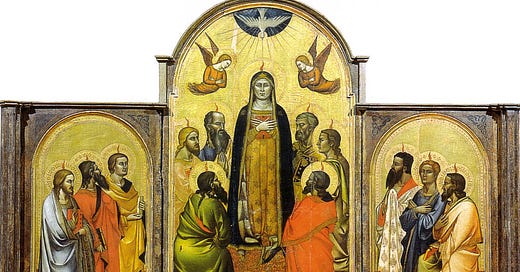You can read the original French here.
Here is my translation.
You don’t expect one of the giants of modernism to say
Nothing is dead but that which does not yet exist
Next to the gleaming past the future is colorless
Apollinaire was the champion of the artistic avant-garde, filled his poem “Zone” with airplanes and buses, and stripped the commas out of all the poems in Alcools to give them the freshness of the new. Yet he was not always, like so many at that self-consciously modern time, a wholehearted evangelist of the future. Why? What he believed in was the ever-renewing spirit of artistic vision and invention, and that spirit is ancient.
“Cortège”1 (“Procession”) is the story of the making of the poet, not in the quotidian sense, by which mommy and daddy love each other etc., but in a cosmic sense. The poet is a Creator and is himself created, like all divine things, spirit first. His particular self, though, is assembled out of everything that has come before.
When I first looked at this poem, I confess I did not know what in the Sam Hill was going on.
Bird flying upside down? This disconnected assortment of people and things reconstructed from little bits? Giants underwater? Bless me, I want to go home.
That bird, though. You can see it in many places, but for me, it appeared most significantly in one of my favorite paintings, Jan van Eyck’s Annunciation Diptych, in Madrid at the Museo Thyssen. (I link to it because their permissions agreement asks too much of me to reproduce it. But do click.)
It was the first thing I saw when I wandered into that museum. (I was roaming Spain on my own trying to remember who I was and what I was doing before I had that lovely little baby.) Looking into it, it is almost impossible for the eye to believe in the flatness of its surface, except for the small conundrum of a marble bird on the wing.
Therefore, having recognized and greeted the Holy Spirit in this poem as an old friend, I worked my way further through the translation, and the rest began to organize itself into a reading. It became clear that this most modern2 of poets saw his work not as a disruption of tradition but as its continuation.
In the poet’s imagination, small sensory details are enough to evoke thousands of other people, but the poet has not been able to summon up himself. Then vast forces, historical and divine, assemble to bring together the language he speaks and the body he inhabits. He is the result of a cosmic effort.
Does he mean this? The poem is written in a register I think of as the special preserve of surrealists—let’s call it the ironic-mystical. (See Salvador Dalì’s claim he was a “Catholic without faith.”) It is an attitude closely related to my favorite Italian expression, “Non è vero, ma ci credo!” It’s not true, but I believe it. Undoubtedly there are genuine grandeur and genuine inspiration here. But there is also a declaration that the poet can reconstruct the entire citizenry of Cologne from the smell of a little dog. I would say, however, that such absurdities intensify rather than cancel the mysticism. Without them, skepticism would raise a lethal eyebrow. With them, we are forced to reckon with these old notions from a new direction.
Books can be (and have been) written on the subject of Apollinaire and religion. I will simply say that some part of Apollinaire’s poetic project is the recognition and renewal of the divine spirit. However, it wants epiphany free from orthodoxy or authority, seeking only ever the increase of that “oblong fire.”
I make these translations and commentaries free for all to read. Like my project? Please share and subscribe.
A cortège is primarily an escort of honor, such as at a wedding or funeral, but also, by extension, any orderly procession of people, or a group of associates.
A perusal of poems published in 1913 shows that Yeats was writing “September 1913,” which is rousing but hardly a modernist manifesto. William Carlos Williams was declaiming in The Tempers a surprisingly old-fashioned verse, and H.D. was publishing in Poetry magazine a trio of small, intense Imagist gems. Ezra Pound carved out the little classic “In a Station of the Metro.” And look! Joyce Kilmer was writing, “I think that I shall never see / A poem as lovely as a tree” that year too, at the same time Gertrude Stein was writing, “Rose is a rose is a rose is a rose.” All good stuff. The French, however, coming off Baudelaire, Mallarmé, and Rimbaud, seemed far, far more deeply committed to the bit.





“First, you catch yourself a bird”
Sanchez is hilarious and brilliant.